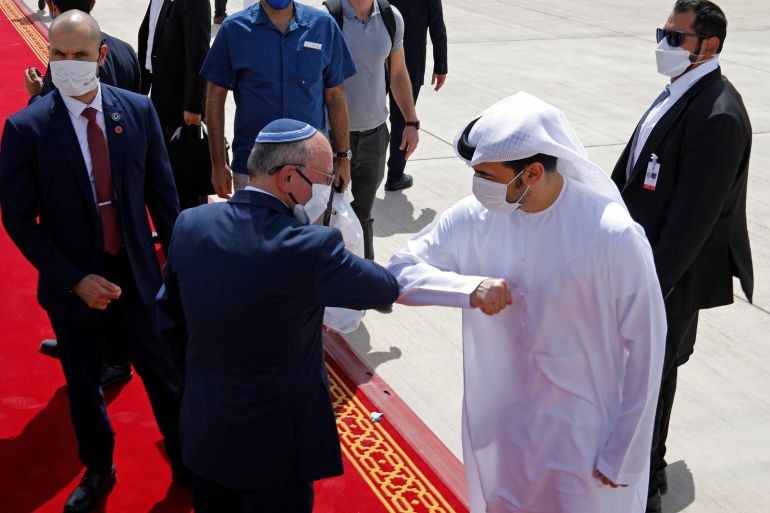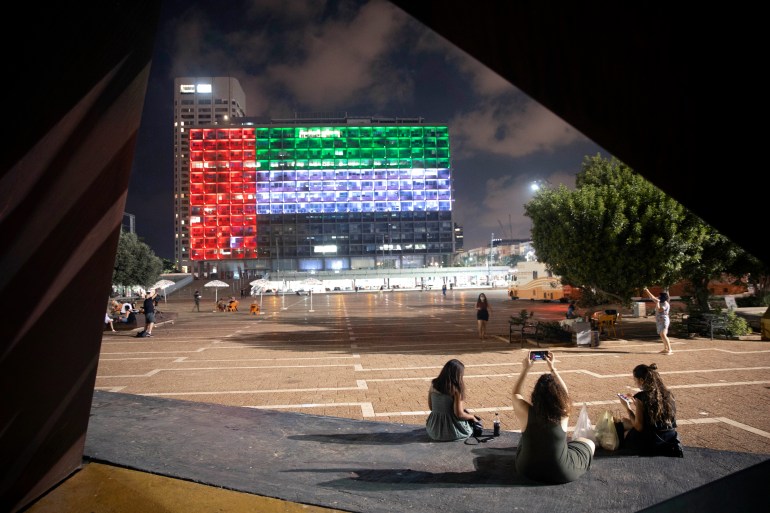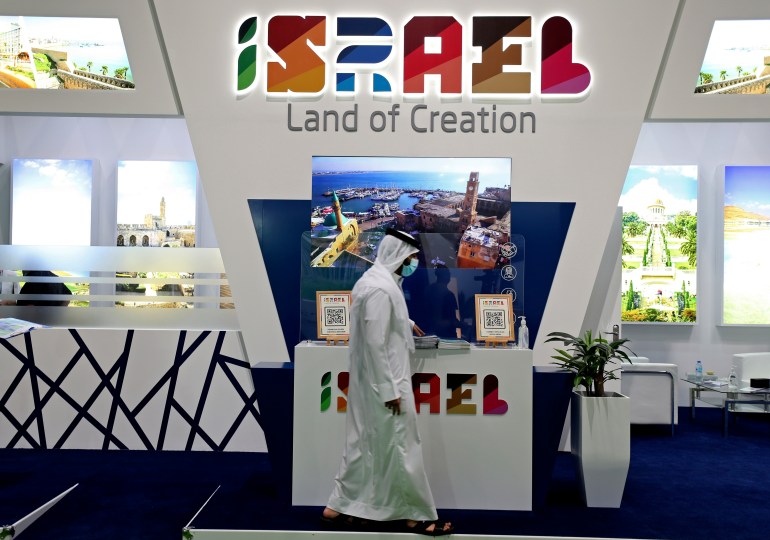Profits or Palestine? UAE-Israel deals likely to continue quietly
The United Arab Emirates has offered to mediate between Israel and Palestine, and behind the scenes are billions of dollars in potential business deals between the UAE and Israel.

As people in Gaza begin the monumental task of rebuilding after 11 days of bombardment by the Israeli military killed at least 254 Palestinians and damaged or destroyed 80,000 people’s homes, another diplomatic clean-up seems to be under way.
Israel’s ambassador to the United Arab Emirates attended the opening of the Arabian Peninsula’s first permanent exhibition dedicated to victims of the Holocaust in Dubai on Wednesday, saying: “What we see here is the exact opposite of what we see in Gaza … What we see here in the whole normalisation process is a departure from the past.”
Keep reading
list of 4 itemsIn Pictures: Gaza fishermen back on the water after ceasefire
Palestinian groups slam UNRWA director’s comments on Gaza attacks
‘A matter of time’: Gaza plans to rebuild despite challenges
The UAE’s de facto ruler, Crown Prince Sheikh Mohammed bin Zayed Al Nahyan, stepped forward and offered to mediate talks between the Israelis and the Palestinians in a call with Egyptian President Abdel Fattah el-Sisi, the state-owned Emirates News Agency reported on Sunday.
At stake is a week-long ceasefire that halted the latest escalation of violence. After signing the United States-brokered Abraham Accords last year, the UAE became the biggest Arab economy to normalise relations with Israel.

Under the agreements, Israel agreed not to annex parts of the occupied West Bank, but no resolution of the Israel-Palestine conflict was required before economic and diplomatic cooperation between the parties could begin.
Hamas called the accords a “treacherous stab to the Palestinian cause” at the time and the Fatah movement criticised the UAE for “flouting its national, religious and humanitarian duties” towards the Palestinian people.
Palestinian President Mahmoud Abbas used his address before the United Nations General Assembly in September to slam the accords and warn “the only path to lasting, comprehensive and just peace” was to end Israeli occupation and create an independent Palestinian state with East Jerusalem as its capital.
Now, scenes of Palestinians grieving their dead, standing among the rubble of destroyed apartment buildings in Gaza and fighting forced evictions from their East Jerusalem homes have left Abu Dhabi’s crown prince, known as MBZ, to strike an even more delicate diplomatic balancing act.
“MBZ seems to be looking to demonstrate that his now-tarnished relationship with Israel has some redeeming value beyond the purely commercial. With much of the world outraged over Israeli behaviour, the UAE’s diplomatic concession is looking foolish,” Jim Krane, a research fellow at Rice University’s Baker Institute and the author of Dubai: The Story of the World’s Fastest City, told Al Jazeera.
“Now that Abu Dhabi has formal ties with Israel, it finds itself with less leverage with the Israelis and no credibility among Palestinians,” Krane added.

While the UAE is under pressure from other Arab nations to show support for Palestinian rights, it seems unlikely to cancel any deals with Israel to do so, Krane said.
Plans are quietly continuing for the Israel-Gulf Cooperation Council Chamber of Commerce and Industry in Dubai to open, and the UAE-Israel Business Council’s Twitter feed has been full of chipper news about kosher catering companies and the first Emirati student to study at an Israeli university.
“Because the economic exchange is very much at the elite level, and to some extent at the state-to-state level, I doubt that we are going to see much change,” Gregory Gause, the head of the International Affairs Department at Texas A&M University’s Bush School of Government Public Service, told Al Jazeera.
“What we won’t see are efforts to publicise it, certainly on the UAE side,” he added. “They’re going to do any kind of economic dealings with Israel with a lot less publicity.”
Flurry of deals
This potentially new, quieter deal-making contrasts sharply with the flurry of announcements in the months after the administration of former United States President Donald Trump brokered historic normalisation agreements between Israel, the UAE, Bahrain, Morocco and Sudan’s transitional government.
As part of the accords, the UAE, Israel and the US International Development Finance Corporation established the Abraham Fund, dedicating more than $3bn for private sector-led investment and development initiatives.
Israeli tourists flocked to Dubai on direct flights from Tel Aviv. The UAE signed agreements with Israel to promote and protect investments in the tourism, security, telecommunications and science and innovation sectors.

Project announcements between firms in the two countries followed in the energy, banking, mobile payment and sport sectors, with Israel’s Eilat Ashkelon Pipeline Company signing a memorandum of understanding to bring Emirati oil to Europe and a UAE royal buying a 50 percent stake in the Beitar Jerusalem Football Club.
Still, the total value of capital investment so far remains modest, with projects from the UAE to Israel standing at about $80m between the end of September and the end of March, and projects from Israel to the UAE amounting to less than $25m, said Karen Young, director of the Economics and Energy Program at the Middle East Institute.
“The normalisation agreement, the establishment of diplomatic ties, it’s all very, very recent,” Young told Al Jazeera. “A lot of the announcements of shared investment funds, of commitments, are not necessarily on the ground yet. Money has not changed hands.”
Future at risk
The potential, therefore, lies much more in future investments. In April, Abu Dhabi’s Mubadala Investment Co, a sovereign wealth fund with assets worth $232bn, signalled it would shell out as much as $1.1bn to buy a stake in an Israeli natural gas field — the biggest potential deal yet.
Yet weeks after Mubadala signed a memorandum of understanding for the gas field deal, images of Israeli soldiers storming the Al-Aqsa Mosque and firing tear gas at Palestinians, as well as Palestinian families fighting forced eviction from their homes in the Sheikh Jarrah neighbourhood of occupied East Jerusalem, forced the UAE to respond.
Two major UAE carriers, Etihad Airways and flydubai, suspended direct flights to Tel Aviv, with Etihad saying it was “in response to the ongoing conflict”.

The UAE’s government condemned the violence in muted terms, with the country’s minister of state for international cooperation stressing “the need for the Israeli authorities to assume their responsibilities — in accordance with international law — to protect Palestinian civilians’ right to practice their religion and to preserve the historical and legal identity of occupied East Jerusalem”, according to a foreign ministry statement.
Krane said the statement shows how the UAE and other Abraham Accords signatories “are walking a tightrope” when it comes to the conflict.
“Ruling elites want to secure their regimes using Israeli surveillance and intelligence technology, but citizens are fed up with the abuses heaped on the Palestinians,” Krane explained.
But because the majority of the UAE’s population are not citizens, “public opinion isn’t as important to the UAE government as it might be to some other Arab governments on this issue,” Gause said.
‘Quiet period’
The Abraham Accords saw “the already pretty robust covert trade just come out into the open”, Krane said, and perhaps because the UAE and Israel’s economic relationship is older than their diplomatic one, it is likely to stand the test of time.
Both countries currently produce goods the other needs — the UAE imports much of its food, and Israel is a major agricultural producer, Krane said, as well as a purveyor of the cyber-surveillance technology that the UAE uses. On the other side, the UAE produces goods fuelled by cheap energy, he explained, such as raw aluminium, glass, fertilisers, petrochemicals and plastics. Both countries have marketed themselves as must-see tourist destinations for citizens from the other.

The accords have represented a major shift in the size and scope of what is possible, Young said, including “major investments by government entities and sovereign wealth funds”.
Israel’s intelligence minister boasted in September that trade between the UAE and Israel would reach $4bn within three to five years. Even with business relationships still nascent, neither side wants to lose out now.
“It’s a big test case for Israel’s ability to build ties with the Arab world,” Krane said. “Can it continue to repress the Palestinians, killing hundreds of them, and maintain relationships with countries that are ostensibly supporting the Palestinian cause? If it survives this test intact and relations continue to move forward and ties deepen, that’s a big hurdle.”
Young predicts a “quiet period” when it comes to new business deals, but said the conflict could also give the UAE an opportunity to become “more activist in their investment commitments”, such as by earmarking a certain percentage of investments for job opportunities or firms in predominantly Arab areas of Israel, “something that was not on the table at all in the previous negotiations”.